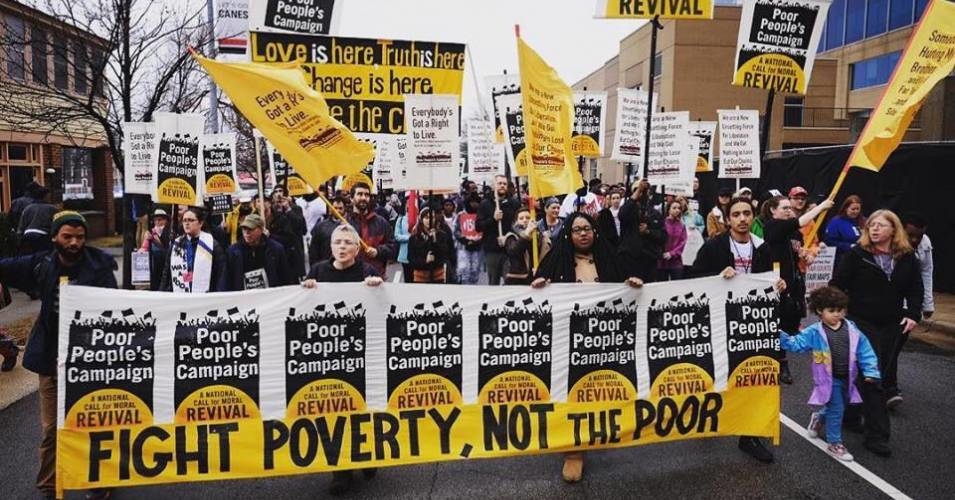EDITOR’S NOTE: On Monday, May 14th, the Poor People’s Campaign: A National Call for Moral Revival will launch nonviolent direct actions at legislative buildings across the country. Organized by grassroots fusion coalitions in 40 states and the District of Columbia, this season of moral activism aims to reset the moral narrative in America and focus public conversation on policies that address poverty, systemic racism, ecological devastation, and the war economy. A mass mobilization is planned for June 23rd in Washington, DC, to be followed by voter education and mobilization throughout the country in the months and years to come. We spoke to RLC’s Jonathan Wilson-Hartgrove, who is a member of the campaign’s steering committee.
RLC: Taking up the Poor People’s Campaign of 1968 — what some talk about as the unfinished business of the civil rights movement — feels like a huge undertaking. What made you want to be part of this effort?
JWH: You’re right. It’s no small thing. But there are literally thousands of people in communities across America who have been working on this for months — building new partnerships, training in moral fusion organizing, naming a moral agenda with impacted people and policy experts, training thousands of people for nonviolent direct action, and preparing to preach this moral message in churches, synagogues, mosques, and temples. I’ve been amazed by the energy people have poured into this campaign — not just for a moment or a march, but to build a long-term movement for years to come. I think the country is generally aware that there’s a “Resistance” that is frustrated with President Trump and his administration. But I don’t think most folks know how many people have been organizing and working to introduce an agenda that neither party has been talking about.
RLC: This seems important. Rev. Barber, who co-chairs the campaign with Rev. Dr. Liz Theoharis, often says that the language of left versus right is too puny — that we need moral language in the public square. Most Americans are used to thinking of the Moral Majority when they hear someone talking about morality in politics. Why does the Poor People’s Campaign want to take up that language?
Because fusion coalitions that have built moral movements are the only thing that has ever moved this nation toward a more perfect union. That’s the story of abolition in the 19th century and of Reconstruction after the Civil War. Rev. Barber has articulated the Black-led freedom movement’s insight that the fundamental struggle of democracy in America has been the struggle for reconstruction. The civil rights movement was a second major push toward Reconstruction in the 20th century. And what Dr. King stated clearly as he announced the Poor People’s Campaign 50 years ago was that we can’t reconstruct democracy without a radical redistribution of power — both political and economic power. The language of parties, single-issue advocacy, and self-interest cannot unite a coalition that is willing to make the sacrifices necessary for reconstruction. We need the moral force of truth and love and justice.
RLC: But that language, as you have written about in Reconstructing the Gospel, has been hijacked. Religion and morality were used to justify resistance to abolition, Reconstruction, and civil rights. The data suggests that Trump’s presidency today would be impossible without the support of Christian nationalists. Can the Poor People’s Campaign change that?
We have to try. Yes, slaveholder religion is with us still — and it has significant financial backing. But I read the biblical prophets closely this spring, as Rev. Barber, Rev. Sheryl Uzzell, and I visited nine seminaries across the country and talked public theology and moral activism with more than 2,000 seminarians and clergy. Those prophets are not optimistic. Sometimes, God assures them ahead of time that no one is going to listen. Even still, they cry aloud and spare not. They speak the truth anyway. They are determined to put it on the record that there was at least one dissenter. Because, over and again, the promise is that, out of the stump that remains when the powerful are cut down, something new will arise. Even if there’s only a remnant, that’s where the seeds of another future are sown.
I believe this Poor People’s Campaign: A National Call for Moral Revival has the capacity to reveal the hope of the gospel to America — that, as the Psalmist says, “the stone that the builders rejected has become the chief cornerstone.” Most people I talk to know America is in a mess. The parties aren’t going to save us. The corporations aren’t going to save us. How does God want to save us from the generational trauma of this nation’s original sin? I see a nonviolent army of people who’ve been rejected coming together — Black, white, and brown; gay, straight, and transgender; Republican, Democrat, and Independent. Together, we’re saying, “We know we’re not perfect. There’s no perfection in our past to harken back to. But we can walk forward together to a better future. We can do the hard work of reconstructing democracy — not only for our own sakes, but for the sake of all who hunger and thirst for justice.”
RLC: How can Red Letter Christians get involved and support the campaign?
The actions happening over the next 40 days are happening in 40 states. So there’s somewhere within driving distance where you can go and join us. But even if you can’t make it to a capital city for a Moral Monday, the campaign is also livestreaming teach-in Tuesdays and Theomusicology Thursdays. We have a religious committee that has put together resources for churches and mosques and synagogues to use over the weekend. And every Sunday evening for the next six weeks, there will be a mass meeting livestreamed from Washington, D.C. You can host a watch party at your church or home or community center. For more info on all of this, anyone can plug in by registering with the campaign.

